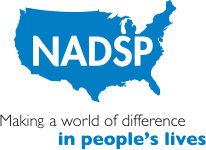Summary:
The National Alliance for Direct Support Professionals (NADSP) has developed a national credentialing program for direct support professionals working in community human services. The purpose of this credentialing program is to provide national recognition for the contributions and competence of direct support professionals who apply for and meet the credentialing standards. The NADSP credentialing program offers powerful benefits to practitioners, their employers and to the people they support. Direct support professionals benefit by learning and applying best practices and evidence-based skill and knowledge in the workplace. The organizations employing credentialed DSPs can provide stronger assurances of quality to funders and consumers, and can proudly market their employment of nationally credentialed staff. People receiving supports from credentialed DSPs will have the advantage of partnering with highly trained professionals committed to supporting them using the ethical and effective interventions that they have mastered. Finally, evidence suggests that employees who complete rigorous credential programs stay on the job longer and provide a higher quality of support. This workshop will explore the best practices of implementing a career ladder program.
9:00 – 10:30 – The NADSP Credential:
An Overview: This session will describe the NADSP’s competency-based career ladder for direct support professionals and why, after twenty years of significant workforce crisis, career ladders are strongly being considered as a viable option for recruiting and retaining highly skilled professionals.
10:30 – 10:45 Break
10:45 – 12:15 Building a Portfolio that Demonstrates Competence:
The NADSP credentialing model measures competence through a set of practical work samples and reflective statements that are illustrated in a professional portfolio. This session will de-mystify the process and describe ways that DSPs are currently exhibiting competence everyday. We will share actual work samples and walk through the steps and timelines that lead to quality demonstration of direct support practice and skill.
12:15 – 1:00 Lunch
1:00 – 2:30 Organizational Best Practices in Creating Career Ladders:
This session will review the best practices and potential barriers to implementing a successful career ladder program in an organization; including the selection of DSPs to pursue credentialing, effective communication strategies, building a learning cohort, blended learning/effective adult learning models, skill mentors and agency Champions, recognition strategies and spreading it like ivy.
2:30 – 2:45 Break
2:45 – 3:30 Wrap Up, Review and Q&A:
Building a career ladder for DSPs is largely about advancing, measuring and promoting knowledge, skills and values; but it’s also about culture change and promoting the roles of DSPs in an organization and how they are seen by society. This closing is an opportunity to share ideas, ask questions and review the information that was shared during the day.
This opening session offers a chance to reflect on the evolving roles and expectations of Direct Support Professionals. Many of these changes are driven by the Centers for Medicare & Medicaid Services (CMS) and its Federal Home and Community-Based Services Community Rule. This is a radical departure from which we are accustomed and will ultimately create an emphasis on ‘personal autonomy’, greater access to ‘integrated settings’ and helping people to make ‘informed choices’. The focus of this session addresses one important piece of the CMS Rule; how do we support people with disabilities to make informed decisions? What is the direct support professional’s role in this process? What are the workforce demographics and projections to fulfill these expectations? Do direct support professionals currently possess the tools, resources and skills to uphold this responsibility?
Presenters will share real examples culled from decades of practicing in the field of intellectual disabilities in a role play, unlike any other. In learning about ethical responsibilities, John will act out some real dilemmas and ethical decisions that confront direct support professionals on the job every day. Using the NADSP’s Code of Ethics, participants will consider ways that ethical practices can be incorporated into daily practice. The beliefs and attitudes that are associated with being an effective human service professional are critical to understanding this code – it is not the handbook of the profession, but rather a roadmap to assist us in staying the course of securing freedom, justice, and equality for all. (90 minutes)
The cornerstone of every profession is a standardized set of competencies with which all practitioners carry out their craft. The NADSP assisted the state of New York’s Office for People with Developmental Disabilities (OPWDD) in creating a standardized set of Core Competencies for direct support professionals. Since that time, we have contracted with many states and have provided dozens of training sessions across the country as provider organizations begin to understand the value of competency-based training. This session will introduce the NADSP Competency set in an engaging, though-provoking and fun manner. The audience will break into small groups and discuss the competencies…and then the fun (and learning) begins. (90 minutes)
A facilitated discussion that investigates how direct support professionals can use the ethical practices, professional skills and adept reasoning to assist people in making informed decisions and meeting the new CMS definition of “Community”. This session will begin a deeper discussion by asking three questions that will identify ways that the spirit of the NADSP’s Code of Ethics and Competencies will be incorporated in assessing Risk and balancing Safety. Part of the discussion will focus on how the organization can create a culture of competence with skilled, ethical and empowered direct support professionals that will lead the way to Quality. (60 minutes)
We can accommodate any size group, but for larger groups, a/v is very important as poor sound and visual systems really can ruin the day for our audience. Here is what we’ll need in terms of a/v:
* LCD Projector and screen (we will use our laptop)
* Sound from our computer adequate for the entire room to hear
* Two lavaliere/lapel microphones and one cordless, hand held microphone
* A PA system to adequate for audience to hear


